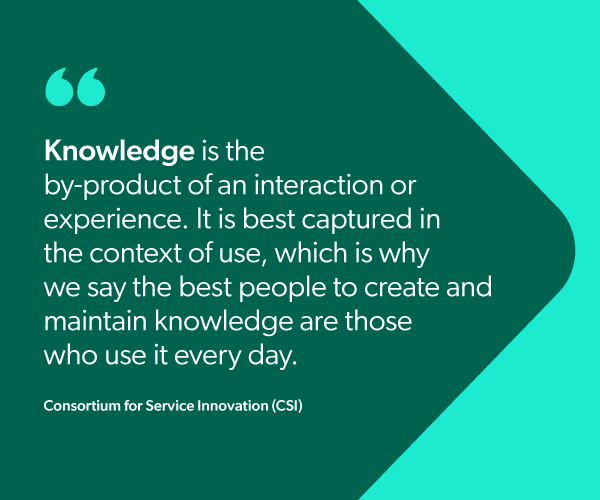I’ve been working in the support world for a long time. Having started my career as an engineer, I’ve been used to being on the reactive side of knowledge management. Have a problem? Here’s how to fix it.
But as my career has progressed, here at Coveo I crossed the chasm from support (and knowledge management) to customer service. Since we deal all day with customers, we are on the front line of repetitive questions. And yet, we have to head to the support team for assistance and documentation — they are the typical home for knowledge management. What if instead, knowledge management reported into customer service?
Let’s take a step back. Knowledge Centered Service is the proven methodology for integrating the creation, use, review and improvement of knowledge into a service workflow.
S Is for Service
Developed almost 30 years ago by the Consortium for Service Innovation (CSI), KCS® was tucked into the support organizations of primarily tech companies. In fact, up until a few years ago, the S in KCS stood for Support – not service.
And while the name has evolved, the staffing (and line of reporting) has not.
According to the CSI, ‘Knowledge is the by-product of an interaction or experience. It is best captured in the context of use, which is why we say the best people to create and maintain knowledge are those who use it everyday.”
Indeed, having a knowledge management strategy is key to ensuring employees are empowered to best serve your customers and ensure they are successful.
So why is KCS still reporting into the support function?
Proactive vs Reactive Customer Service
With Customer Success a growing industry (according to Linkedin Jobs report of emerging jobs it’s #6) the service sector is expanding beyond the “react and fix” nature of traditional support, to include a strategic and proactive customer success model.
CSI states, “Knowledge is the by-product of an interaction or experience. It is best captured in the context of use, which is why we say the best people to create and maintain knowledge are those who use it every day.”
If we are to “unpack this” as the pundits like to say, “By-product of interaction” points directly to Customer Success. I mean who deals more with a customer than the CSM? From the break and fix question, the how-to, and strategic product application type, we see it all — “every day.”
And since KCS is a proven methodology for integrating the creation, use, review and improvement of knowledge into a service workflow, KCS workers have been most typically people in the support department. They are answering customer questions and generating content based on the cases they are solving.
What I suggest is, the CS team is still further upstream in the user journey and equally involved in customer interactions and problem solving and that any KCS program rollout should include not only the support team, but also your CS team, and maybe even led by the CS team.
Knowledge Centered Customer Success
If I really want to push the envelope, we could say that if Customer Success is really at the center of your company, then KCS should become KCCS – Knowledge Centered Customer Success. Successful CSMs have a combination of both product and industry knowledge, thus are well placed to answer strategic questions.
As customers mature, the questions change in tone, from the implementation / fixing type, to strategic and how-to sorts of questions. In fact, because we are so close to the customer this gives us a distinct advantage. It’s a matter of fact that customers don’t always use a product in the way it is intended to be used.
The success team’s knowledge of both the customer and the product allows us to communicate in the lexicon of the customer. This hopefully means we can understand capability, functionality and value that can be driven from the product – in the lexicon of the customer and even drive ideation through the innovative usage.
In fact, as my colleague Bonnie Chase points out to me, “Product management and support teams know how things are supposed to work. Customer Success sees how things really work.”
That’s a huge distinction. Faced with new challenges at work, customers do things with products that we often can’t predict – and they can find shortcuts and kluges that we may never have known possible. In our role, we can capture these ideas – and feed them back into the product management and marketing strategy.
While I didn’t intend this to be a career advice column for Customer Success managers. There are other advantages. You are likely to progress into other roles, Account Management and Product Management to name just two. It is imperative to capture tacit knowledge during the time in the role and prevent the experience from being lost.

Great Service Is a Team Sport
As a Customer Success Manager with a technical background, I do my best to even do the “solve and fix” part of customer interactions. But that is not my job and I have to be disciplined to say NO, please open a support ticket. Customer Success is after all a team effort. No one person has all the answers and being able to know who holds that specific piece of knowledge can be a real help.
Within a CS team, the combined knowledge of the many, with a good relevance platform to find them in, can create a very scalable usable resource to ensure successful customer interactions and business outcomes.
I got into knowledge management because I was writing articles as a support engineer. I ended up taking over management of the knowledge base because the idea of sharing information and making it available in a way that’s usable by others, was very natural to me.
My pathway to knowledge management was textbook: engineering, support, knowledge management. But somewhere along the way, I migrated to the front line of customer service. My needs for KCS are actually greater – and what I can contribute – is even more so.
I’m at home now in Customer Success. Knowledge Management would find it a great place to be as well.
Dig Deeper
Learn more about KCS and see if it is right for your organization.
KCS® is a service mark of the Consortium for Service Innovation™.


